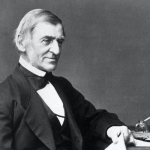Thou art not my friend, and I'm not thine.
Long through thy weary crowds I roam;
A river-ark on the ocean brine,
Long I've been tossed like the driven foam;
But now, proud world! I'm going home.
Good-bye to Flattery's fawning face;
To Grandeur with his wise grimace;
To upstart Wealth's averted eye;
To supple Office, low and high;
To crowded halls, to court and street;
To frozen hearts and hasting feet;
To those who go, and those who come;
Good-bye, proud world! I'm going home.
I am going to my own hearth-stone,
Bosomed in yon green hills alone, —
A secret nook in a pleasant land,
Whose groves the frolic fairies planned;
Where arches green, the livelong day,
Echo the blackbird's roundelay,
And vulgar feet have never trod
A spot that is sacred to thought and god.
O, when I am safe in my sylvan home,
I tread on the pride of Greece and Rome;
And when I am stretched beneath the pines,
Where the evening star so holy shines,
I laugh at the lore and the pride of man,
At the sophist schools, and the learned clan;
For what are they all, in their high conceit,
When man in the bush with God may meet?



















Comment form: